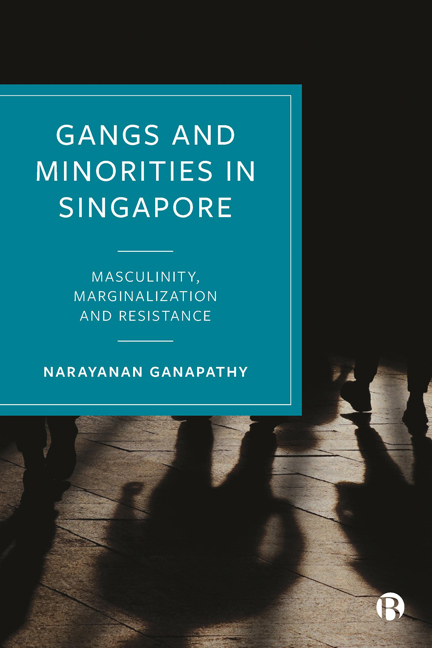Book contents
- Frontmatter
- Contents
- List of Figures
- List of Abbreviations
- Glossary of Non-English Terms
- About the Author
- Preface
- 1 Introduction: Framing the Study
- 2 Omega as Organized Crime?
- 3 Racial Minorities and Crime
- 4 Methods of Study
- 5 The Rise of Omega
- 6 Fearless and Fearsome
- 7 The Omega Wave: The ‘Triadization’ of Omega
- 8 Conclusion: Law, Drug Crimes and Marginality
- Notes
- References
- Index
2 - Omega as Organized Crime?
Published online by Cambridge University Press: 28 March 2024
- Frontmatter
- Contents
- List of Figures
- List of Abbreviations
- Glossary of Non-English Terms
- About the Author
- Preface
- 1 Introduction: Framing the Study
- 2 Omega as Organized Crime?
- 3 Racial Minorities and Crime
- 4 Methods of Study
- 5 The Rise of Omega
- 6 Fearless and Fearsome
- 7 The Omega Wave: The ‘Triadization’ of Omega
- 8 Conclusion: Law, Drug Crimes and Marginality
- Notes
- References
- Index
Summary
During the course of the fieldwork research for this book, it was frequently stressed by my informants from different interest groups – Omega gang members, Chinese secret societies, social work and criminal justice agencies, community organizations and ethnic groups, among others – that the Omega gang was fundamentally different from the Chinese secret societies. This was because the latter have had a long and established presence in both colonial and contemporary Singapore, given their status as an embedded social institution since the early nineteenth century. In fact, Chinese secret societies have traditionally enjoyed a certain level of tolerance, even acceptance, as their activities have been so intimately intertwined with the everyday lives of the ordinary citizens that they are too commonplace, perhaps even too institutionalized, to be conspicuous. The fact that these secret societies are distinct from the Omega gang has some truth to it as the institutional, cultural, political, historical and ideological contexts in which they emerged and expanded are undoubtedly different. While on one level this difference is very real, on another, both Chinese secret societies and the Omega gang do share a commonality, in that both aspire to operate under the umbrella of ‘enterprise crime’ (Levi, 2002: 887). Their aim, therefore, is to make profits in the criminal underworld – though the Omega gang’s criminal ventures came much later, after the gang was exported from prisons to the wider general society in the 1990s. Referencing secret societies is both analytically and empirically helpful in determining whether the Omega gang qualifies to be an organized crime group similar to the likes of Chinese triads. More importantly, it serves to contextualize the emergence, expansion and consolidation of the Omega gang in both prisons and the criminal underworld. In other words, it is impossible to study the Omega gang without an examination of Chinese secret societies and the historical role they have played in the processes of social control via the quasi-symbiotic relationships they established with conventional mainstream institutions. Two objectives logically flow from this. The first is to explore the applicability of the term ‘organized crime’ to the Omega gang, and the second is to document the historical role of Chinese secret societies in colonial and contemporary Singapore in order to better understand the motivation driving Omega and its members to partake in the criminal underworld.
- Type
- Chapter
- Information
- Gangs and Minorities in SingaporeMasculinity, Marginalization and Resistance, pp. 9 - 28Publisher: Bristol University PressPrint publication year: 2023



